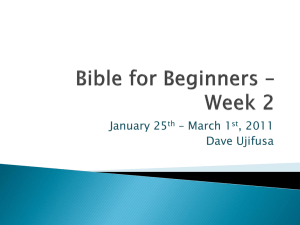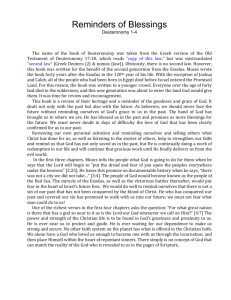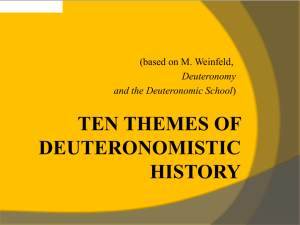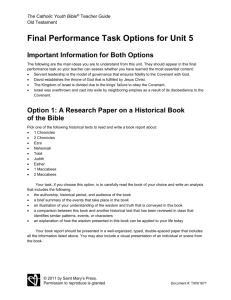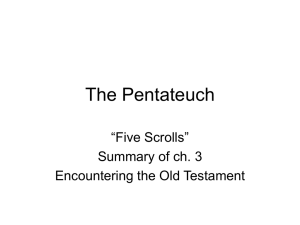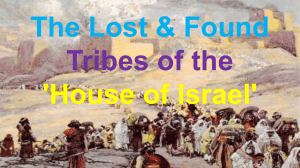Introduction to the Hebrew Bible
advertisement
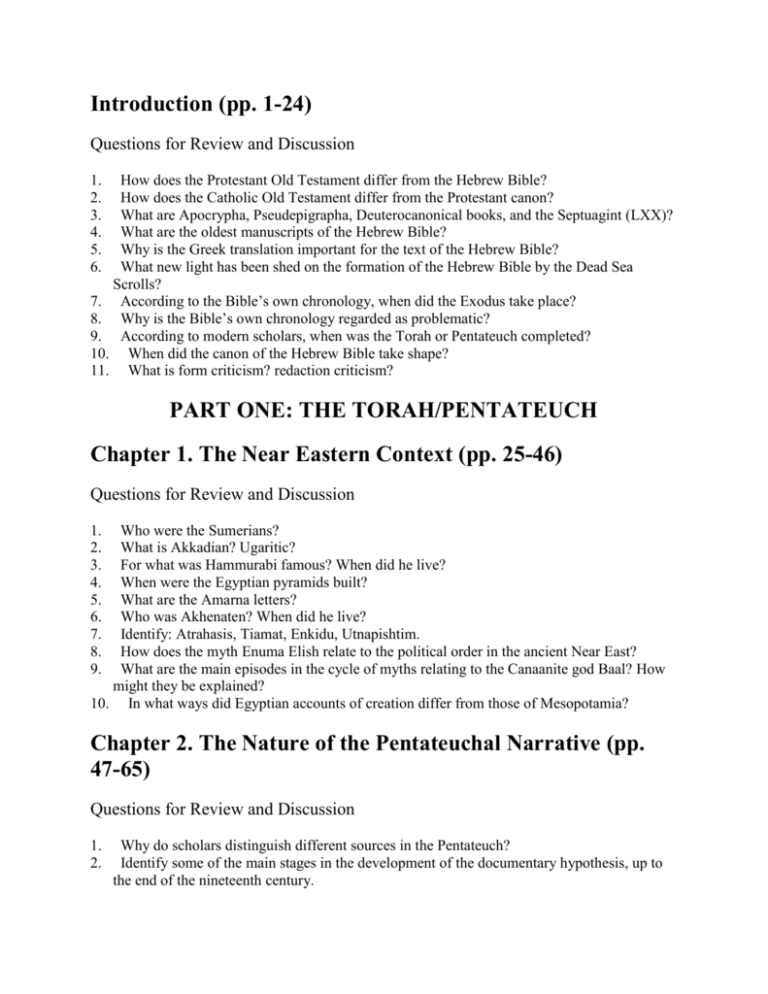
Introduction (pp. 1-24) Questions for Review and Discussion 1. 2. 3. 4. 5. 6. How does the Protestant Old Testament differ from the Hebrew Bible? How does the Catholic Old Testament differ from the Protestant canon? What are Apocrypha, Pseudepigrapha, Deuterocanonical books, and the Septuagint (LXX)? What are the oldest manuscripts of the Hebrew Bible? Why is the Greek translation important for the text of the Hebrew Bible? What new light has been shed on the formation of the Hebrew Bible by the Dead Sea Scrolls? 7. According to the Bible’s own chronology, when did the Exodus take place? 8. Why is the Bible’s own chronology regarded as problematic? 9. According to modern scholars, when was the Torah or Pentateuch completed? 10. When did the canon of the Hebrew Bible take shape? 11. What is form criticism? redaction criticism? PART ONE: THE TORAH/PENTATEUCH Chapter 1. The Near Eastern Context (pp. 25-46) Questions for Review and Discussion 1. 2. 3. 4. 5. 6. 7. 8. 9. Who were the Sumerians? What is Akkadian? Ugaritic? For what was Hammurabi famous? When did he live? When were the Egyptian pyramids built? What are the Amarna letters? Who was Akhenaten? When did he live? Identify: Atrahasis, Tiamat, Enkidu, Utnapishtim. How does the myth Enuma Elish relate to the political order in the ancient Near East? What are the main episodes in the cycle of myths relating to the Canaanite god Baal? How might they be explained? 10. In what ways did Egyptian accounts of creation differ from those of Mesopotamia? Chapter 2. The Nature of the Pentateuchal Narrative (pp. 47-65) Questions for Review and Discussion 1. 2. Why do scholars distinguish different sources in the Pentateuch? Identify some of the main stages in the development of the documentary hypothesis, up to the end of the nineteenth century. 3. 4. 5. 6. What evidence is there for a distinct E source in Genesis? In Exodus? What are the major identifying characteristics of the J source? What is the profile of the P source? Of D? What is the importance of the reform of King Josiah in 621 B.C.E. for dating the sources of the Pentateuch? 7. What are some current criticisms of the documentary hypothesis? Chapter 3. Primeval History (Genesis 1–11) (pp. 67-82) Questions for Review and Discussion 1. 2. 3. 4. 5. 6. 7. What are the main similarities and differences between the Atrahasis myth and Genesis 1– 11? In what ways does the story of Gilgamesh shed light on the story of Adam and Eve? How should we understand the role of the serpent in the story of Adam and Eve? Does the story of Adam and Eve imply a doctrine of original sin? Does it imply that women should be subordinate to men? In what ways does the flood story in Genesis differ from other flood stories of the ancient Near East? What are the main differences between the Priestly account of creation in Genesis 1 and the Yahwist (J) account in Genesis 2–3? What are the main themes that run through the primeval history (Genesis 1–11) in the Yahwist source? Chapter 4. The Patriarchs (Genesis 12–50) (pp. 83-105) Questions for Review and Discussion 1. 2. 3. 4. 5. 6. 7. 8. What dates are implied for Abraham, Isaac, and Jacob by the Bible’s internal chronology? Why are these dates problematic? Who were the Habiru? The Hyksos? What was the contribution of Hermann Gunkel to the understanding of the patriarchal stories? How does the religion of the patriarchs differ from the religion of Israel as it is described in later books such as Deuteronomy? Discuss the role of deception in the stories of Abraham and Jacob. How would you address the ethical problems presented by these stories? How would you address the ethical problem presented by the sacrifice of Isaac in Genesis 22? What purposes are served by the story of Judah and Tamar in Genesis 38? What are the main themes in the Joseph story? What function does this story fill in the unfolding story of Israel? Chapter 5. The Exodus from Egypt (pp. 107-120) Questions for Review and Discussion 1. 2. 3. 4. 5. 6. 7. 8. What evidence is there for an exodus of Hebrews out of Egypt in the latter part of the second millennium B.C.E.? How does archaeological evidence support the biblical story of the Exodus, or put it in question? What is the genre of the narratives in Exodus 1–18? What are the problems in using them as historical sources? What are the oldest traditions that relate the God YHWH to Mount Sinai? What can we learn from them about the early religion of Israel? How do you understand the encounter between Moses and YHWH at the burning bush? How do you understand the story of the crossing of the sea? Can the poem in Exodus 15 be used as an historical source? Why is YHWH portrayed as a warrior in early biblical texts? What are the main Priestly additions to the narrative in Exodus 1–18? Chapter 6. The Revelation at Sinai (pp. 121-138) Questions for Review and Discussion 1. 2. 3. 4. 5. 6. 7. Why are Hittite treaties important for understanding the Mosaic covenant? How do you understand the development of monotheism in Israel? What evidence is there for the worship of the goddess Asherah? What is the difference between apodictic and casuistic law? What is the Book of the Covenant? When is it likely to have originated? What is the attitude to slavery in the laws of Exodus? To adultery? Is biblical law relevant to modern discussions of the death penalty? What are the major festivals in the cultic calendar of Exodus? What well-known biblical festivals are missing from this calendar? Chapter 7. The Priestly Theology: Exodus 25–40, Leviticus, Numbers (pp. 139-158) Questions for Review and Discussion 1. 2. 3. 4. 5. 6. 7. 8. 9. Where can the Priestly source be identified? What are the distinguishing characteristics? What is the Holiness Code (H)? How does it differ from P? What is the importance of the Tabernacle in the Priestly account of early Israel? What kinds of sacrifices are distinguished in Leviticus? What are their various functions? How do you understand the ritual for the Day of Atonement in Leviticus 16? What is the relation between Priests and Levites in the Priestly source? What is the importance of purity in the Priestly theology? What is the relation between moral issues and ritual purity in the Holiness Code? How does the Priestly calendar differ from the calendar in the Book of the Covenant? 10. How do you address the ethical issues raised by the story of Phinehas in Numbers 25? Chapter 8. Deuteronomy (pp. 159-179) Questions for Review and Discussion 1. 2. 3. 4. 5. 6. 7. What is the structure of the book of Deuteronomy? What light is shed on Deuteronomy by ancient Near Eastern treaties? What are the vassal treaties of Esarhaddon? How does the book of Deuteronomy relate to the reforms of King Josiah? In what ways did the centralization of the cult change the religion of ancient Israel? In what ways do the laws of Deuteronomy differ from those of the Book of the Covenant? In what ways does the cultic calendar of Deuteronomy differ from other cultic calendars in the Pentateuch? 8. What is the role of prophets according to Deuteronomy? 9. What is the role of the king in Deuteronomy? 10. What is the relation of Deuteronomy to the wisdom tradition? 11. Who were the likely authors of Deuteronomy? 12. What are the main arguments for the relative priority of P and D? How do you assess them? PART TWO: THE DEUTERONOMISTIC HISTORY Chapter 9. Joshua (pp. 183-202) Questions for Review and Discussion 1. 2. 3. 4. What is the Deuteronomistic History? What are its unifying themes? What is the archeological evidence for the origin of Israel in Canaan? What archeological evidence is there for the conquest described in the book of Joshua? What different models for the origin of Israel have been proposed in modern scholarship? How do you assess them? 5. What is the stele of Merneptah, and what is its importance for the history of Israel? 6. What is the importance of the Amarna letters for discussions of the origin of Israel? 7. What is the understanding of holy war in Joshua? 8. How do you understand the story of the destruction of Jericho? 9. What is the herem or ban? What historical evidence is there for such a practice? 10. How do you address the moral problem of the commands to slaughter the Canaanites? Chapter 10. Judges (pp. 203-216) Questions for Review and Discussion 1. 2. 3. 4. 5. 6. 7. How does the picture of early Israel found in Judges relate to the story of the conquest in Joshua? How does Israel appear to be organized in the period of the Judges? In what ways has the Deuteronomistic editor shaped the stories of the Judges? For what traits are the judges praised? How do you address the ethical problems presented by such stories as the killing of Sisera by Jael, or the sacrifice of Jephthah’s daughter? What attitudes toward kingship do we find in the stories in Judges? Why is the story of Samson included in the canonical scriptures? Chapter 11. 1 Samuel (pp. 217-230) Questions for Review and Discussion 1. 2. 3. 4. 5. 6. 7. What attitudes toward kingship do we find in 1 Samuel? How do you account for the variation among them? How is Samuel portrayed in 1 Samuel? How does his role relate to that of the judges? To that of later prophets? What is the significance of the story of the capture of the ark? How do you understand the relationship between Saul and Samuel? What purposes are served by the various accounts of the emergence of David? How do you understand the relationship between David and Saul? Between David and Jonathan? How do you address the ethical issues raised by David’s early career as an outlaw and mercenary? Chapter 12. 2 Samuel (pp. 231-244) Questions for Review and Discussion 1. 2. 3. 4. 5. 6. 7. 8. 9. What steps does David take to consolidate his position as king? What ethical issues are raised by his actions? What role does the Deuteronomistic editor play in shaping the books of Samuel? How do you understand the promise to David? How does it relate to the Mosaic covenant? To the theology of the Deuteronomistic history? What is the role of the prophet Nathan in 2 Samuel? What is the royal ideology of Judah? Where is it attested? What is the relation of the Davidic king to God in the royal ideology? What is the importance of the promise to David, and of the royal ideology, for later Judaism and Christianity? How do you address the ethical problem presented by David’s affair with Bathsheba? How do you understand the succession narrative? How does it portray David? Chapter 13. 1 Kings 1–16: Solomon and the Divided Monarchy (pp. 245-260) Questions for Review and Discussion 1. 2. 3. 4. 5. 6. How are the books of Kings shaped by the Deuteronomistic editors? What is the nature of David’s deathbed advice to Solomon? What are presented as the main accomplishments of King Solomon? How do modern historians assess the reign of Solomon? What is the character of Solomon’s wisdom? What is the role of the temple in the religion of Judah, according to the Psalms? According to 1 Kings? 7. What factors led to the division between the kingdoms of Israel and Judah? 8. How are the actions of Jeroboam in setting up sanctuaries in northern Israel portrayed in 1 Kings? How do you assess them? Chapter 14. 1 Kings 12—2 Kings 25: Tales of Prophets and the End of the Kingdoms of Israel and Judah (pp. 261-279) Questions for Review and Discussion 1. What picture do we get of the working of prophecy in Israel from the story of Micaiah ben Imlah in 1 Kings 22? 2. What historical value can be attributed to the stories of Elijah and Elisha? 3. In what ways do the stories about Elijah symbolize the conflict between YHWH and Baal? 4. How do you evaluate the action of Elijah in killing the prophets of Baal? 5. What is the function of the story of Elijah’s journey to Mt. Horeb in 1 Kings 19? 6. What is the function of the story of Naboth’s vineyard in 1 Kings 21? 7. Compare and contrast the stories about Elisha with those about Elijah. 8. What ethical issues are presented by the story of Jehu’s coup? 9. What extra-biblical evidence do we have for the end of the kingdoms of Israel and Judah? 10. How is the end of these kingdoms evaluated in 2 Kings?


